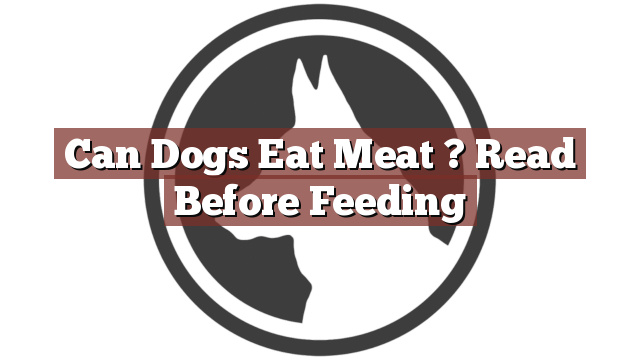Understanding Your Dog’s Dietary Needs
Understanding your dog’s dietary needs is crucial for maintaining their overall health and well-being. As carnivores, dogs require a diet rich in animal protein to thrive. While commercial dog foods often provide a balanced combination of nutrients, many pet owners wonder if they can also feed their dogs meat directly. In this article, we will answer the question, "can dogs eat meat?" and provide valuable insights to help you make informed decisions about your furry friend’s diet.
Can Dogs Eat Meat? Read Before Feeding
Can dogs eat meat? The answer is a resounding yes. Dogs are natural carnivores, and their bodies are designed to process and digest meat efficiently. In fact, meat is an excellent source of protein, essential amino acids, vitamins, and minerals for your canine companion. Feeding your dog meat can promote muscle development, maintain a healthy coat, and support their overall growth and vitality.
However, not all types of meat are safe for your dog to consume. Some meats, like raw pork or chicken, can contain harmful bacteria such as salmonella or E. coli. It is crucial to cook the meat thoroughly to eliminate these bacteria and ensure your dog’s safety. Additionally, avoid seasoning the meat with spices or additives that may be toxic to dogs, such as garlic or onion powder. Always opt for lean cuts of meat and remove any bones, as they can pose a choking hazard or cause intestinal blockages.
Pros and Cons of Feeding Meat to Your Dog
Feeding meat to your dog offers various benefits, but it is essential to consider both the pros and cons before incorporating it into their diet.
Pros:
- Nutritional Value: Meat is an excellent source of protein, which is vital for your dog’s muscle growth, repair, and overall health.
- Improved Digestion: As carnivores, dogs possess shorter digestive tracts that are designed to process meat efficiently.
- Dental Health: Chewing on meat can help clean your dog’s teeth and promote better oral hygiene.
- Texture Variety: Adding meat to your dog’s diet can provide a different texture and enhance their mealtime experience.
Cons:
- Food Safety: Improperly handled or uncooked meat can contain harmful bacteria that may cause foodborne illnesses in dogs.
- Balance and Moderation: While meat is beneficial, it should not replace a complete and balanced diet. It is crucial to provide a well-rounded meal that includes other essential nutrients.
- Allergies and Sensitivities: Some dogs may have allergies or sensitivities to certain types of meat. Monitor your dog’s reactions and consult with a veterinarian if you suspect any issues.
Conclusion
In conclusion, dogs can indeed eat meat, and it can be a valuable addition to their diet. However, it is essential to ensure the meat is cooked thoroughly, seasoned appropriately, and provided in moderation. Always prioritize the safety and well-being of your furry friend by consulting with a veterinarian to determine the best diet plan for your specific dog. By understanding your dog’s dietary needs and making informed choices, you can help them maintain optimal health and happiness.
Thank you for taking the time to read through our exploration of [page_title]. As every dog lover knows, our furry friends have unique dietary needs and responses, often varying from one canine to another. This is why it's paramount to approach any changes in their diet with caution and knowledge.
Before introducing any new treats or making alterations to your dog's diet based on our insights, it's crucial to consult with a veterinarian about [page_title]. Their expertise ensures that the choices you make are well-suited to your particular pet's health and well-being.
Even seemingly harmless foods can sometimes lead to allergic reactions or digestive issues, which is why monitoring your dog after introducing any new food item is essential.
The content provided here on [page_title] is crafted with care, thorough research, and a genuine love for dogs. Nevertheless, it serves as a general guideline and should not be considered a substitute for professional veterinary advice.
Always prioritize the expert insights of your veterinarian, and remember that the health and happiness of your furry companion come first.
May your journey with your pet continue to be filled with joy, love, and safe culinary adventures. Happy reading, and even happier snacking for your canine friend!

